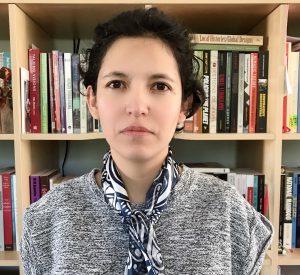
HAHR Forum on Contemporary Bolivia and History
 Carmen Soliz is an assistant professor of Latin American history at University of North Carolina at Charlotte. Her article “‘Land to the Original Owners’: Rethinking the Indigenous Politics of the Bolivian Agrarian Reform” appeared in HAHR 97.2.
Carmen Soliz is an assistant professor of Latin American history at University of North Carolina at Charlotte. Her article “‘Land to the Original Owners’: Rethinking the Indigenous Politics of the Bolivian Agrarian Reform” appeared in HAHR 97.2.
Evo Morales: His Political and Economic Legacy
Evo Morales first came to power in 2005 with the support of a coalition of multiple social sectors. His most important support came from the coca leaf growers (cocaleros) in the Chapare region. The cocaleros have a long history of struggle against US policies of forced eradication of the coca leaf that started in Bolivia in the late 1980s. In 2005, Morales also garnered the support of urban and rural sectors who rose up against the effects of 15 years of neoliberal reforms that had auctioned public companies to foreign investors. These sectors demanded the nationalization of gas, Bolivia’s most important export since the 1970s, and of the country’s strategic resources including water and electricity, among others. Morales also came to power with the support of the National Peasant Federation (CSUTCB) and indigenous organizations from the lowlands (CIDOB) and the highlands (CONAMAQ). In Bolivia and Latin America Morales represented a different economic model, one that protected the rights of Mother Earth.
In his 14 years in power, Evo Morales fulfilled many of these long-awaited demands. He defended the production of coca leaves for the internal market; expelled the Drug Enforcement Administration (DEA), reducing military violence against cocaleros; and nationalized the gas, water, electric, and telecommunications companies. These achievements cultivated a sense of national sovereignty that contrasted with decades, if not centuries, of Bolivians feeling systematically stripped of their natural resources. Morales achieved a miracle in Bolivian economic history—robust economic growth and massive redistribution of resources, which guaranteed the reduction of extreme poverty and inequality. One critical policy for battling extreme poverty consisted of cash transfers from gas revenues to schoolchildren, expectant and new mothers and their infants, and the elderly.
Yet, Morales’s economic policies and political style also led to criticisms that I would group in three categories: criticisms of his model for economic development, criticisms of his public expenditure programs, and criticisms of his political practices. First, environmental activists, indigenous groups, and left-wing activists questioned the disjointedness between Morales’s pro-environmental and pro–indigenous rights rhetoric and his extractive neodevelopment at the expense of indigenous and national parks. They also objected to Morales’s growing alliance with Bolivian agribusiness. Morales legalized the illegal forest clearing that commenced in 1996; authorized the production of GMOs for corn, cotton, and sugar; and agreed to expand the agricultural frontier for the export of meat to China. Morales’s economic model was increasingly closer to capitalism than to the promised socialism of the twenty-first century. Second, many questioned his focus on short-term public investment at the expense of other and more substantial types of public investment. During the past several years, many became exasperated with the millions he spent on soccer fields in hundreds of rural towns in order to guarantee political support to him, while he postponed investments in the obsolete and underfunded health system. Third, Morales showed clear signs of abuse of power. The government eroded the independence of state powers, persecuted some of his political opponents, and named illegitimate leaders to divide the once strong indigenous and peasant organizations. The questionable practice that prompted the most anger was his stubborn decision to run illegally as a candidate for a fourth term.
Although Morales still has massive support from urban and rural sectors (he received 47 percent of the popular vote in the 2019 election), these practices have alienated an important portion of the coalition that put him in power in 2005, 2009, and 2014. As of today, I consider his legacy—the enfranchisement of the majority Indian population, a massive distribution of wealth, the consolidation of national sovereignty, and economic and political stability—to exceed the most controversial elements of his government. However, his attempt to remain in power at any cost has endangered the democratic character of the political process that started in 2003 and has yielded the card of democracy to the right wing of Bolivia and Latin America.
Top image: Mercha a favor de Evo Morales – Buenos Aires. November 18, 2019. Photograph by Santiago Sito, licensed under CC BY-NC-ND 2.0. (Find the original here.)
